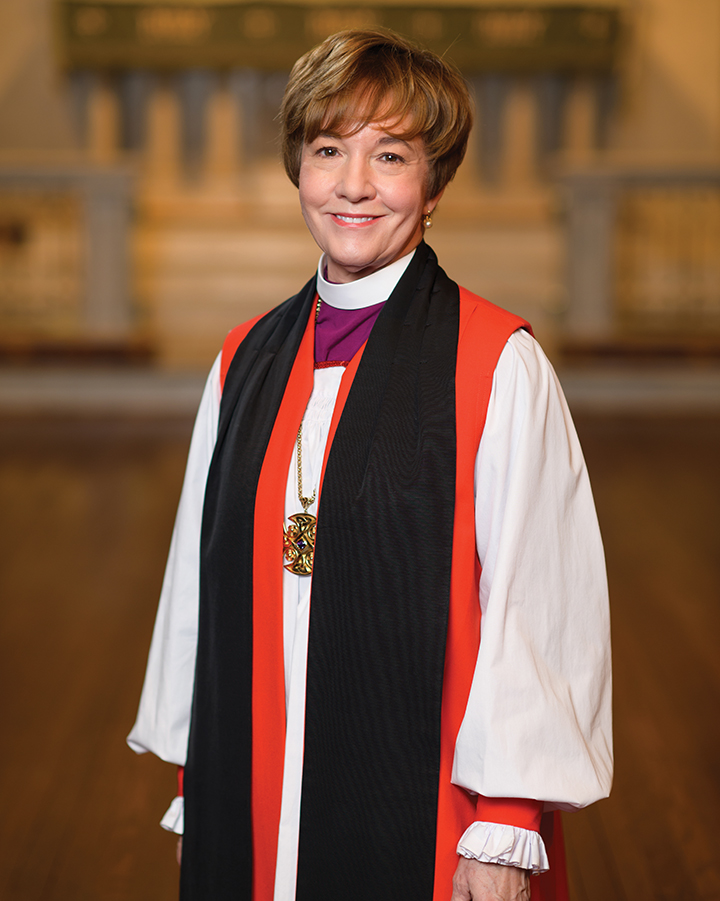Nature and Grace in a Time of Coronavirus

I am writing this in the middle of Holy Week. It is a time when our churches are usually bustling with Holy Week activities, and we are concluding our Lenten journeys of penance and reflection, engaging in the ritual orientation of our liturgical calendar, and anticipating the culmination of the Christian year celebrated at Easter services throughout our Diocese. Of course, there is nothing usual about what is happening during Holy Week this year. Instead of our usual activities, we are in the midst of the COVID-19 pandemic that has swept the globe in a matter of months. While we are completing our Lenten journeys, we are not doing so in physical proximity to our fellow members of the congregations we call home. Churches throughout the Diocese have grown largely silent as we have become communities in isolation now familiar with the new normal of social distancing.
With this in mind, it may seem strange that I write to you now from the perspective of diocesan Chartered Committee on Environmental Ministry. Our ministry typically focuses on the beauty and blessing of God’s creation, but ironically, in these times, we also recognize that our current situation, involving the infectious coronavirus COVID-19, also represents our relationship with our natural environment. We are then forced to come to terms with the uncomfortable fact that this part of our experience with God’s creation can make us vulnerable as individuals and as communities.
I distinctly remember one of the first Sunday Forum talks that I presented on environmental ministry now almost 10 years ago. I spent most of the talk speaking of the awe and wonder of the Earth’s ecology and how we can perceive God’s grace in the natural. One of the first questions during the question and answer session was the following: “What about black holes and hurricanes?” I don’t remember exactly how I responded, but of course, this was an appropriate question. Nature does not always favor our interests or even our health. And so, we as a religious community are left to ponder how we reconcile these uncertainties caused by the very natural environment that sustains our lives and that, theologically, we understand as the gift of God’s evolving creation.
There is a long debate in Christian history concerning the distinction between nature and grace. Without getting too deep in the theological weeds and at the risk of oversimplifying what can be a complex theological issue, the debate can be summarized by the view that nature (both human and non-human nature) has been damaged, at least to a certain degree, as a result of sin and is therefore fallen and in need of redemption from God’s grace. I have to admit that this stark distinction between nature and grace has never made much sense to me.
It is true that the elements that make life possible on Earth were formed in the violence of cosmic explosions many billions of years ago. Furthermore, life on our own planet, that perhaps until recently has seemed mostly hospitable for those of us living in this part of the world, has experienced several mass extinction events during the billions of years life has existed on Earth. Nevertheless, life returns emerging once again with steady resilience. When we contemplate the 14 billion year natural history that led to life on our small planet, there is nothing fallen about the tendency toward diversity and complexity that has characterized the history of our universe and life on Earth. Far from the dichotomy of nature in need of redemption through divine grace, we see the emergence of nature imbued with a grace that nurtures the flourishing of life.
Yet, the flourishing of life does not always mean that life will go as we wish, and our Easter hope does not shelter us from death and disappointment. In fact, it reminds us that these are an inevitable part of life, but it also provides the promise of renewal through God’s grace in that life returns and continues to emerge despite the despair and apparent defeat of the cross.
From the perspective of environmental ministry, an important concept to consider in these strange and uncertain times is the concept of community. Community implies that we are all in this together, and the current pandemic highlights how very connected we are to each other and to the natural environments in which we live. Over the last few weeks, we have learned to define community in novel ways. For those of us who are able, we are staying home as much as possible, separating ourselves from only essential physical interaction with others. This is done for the elderly, immunocompromised and those with underlying health conditions who are more susceptible to dangerous infection and on behalf of emergency workers, medical professionals, food service personnel and other essential workers who do not have the option of staying home. It is also done for those who may have lost employment so that we can move past the threat of pandemic as soon as possible in order to begin the work of economic recovery. Our diocese has made the painful but necessary decision to suspend traditional worship until [at least] mid-May for the protection of public health. And so, we are learning new ways of worshipping online and perhaps paying more attention to private devotions. In all of these ways, even in separation, we become better by joining together in community.
Recognizing the need to adjust to the changing needs of our community, the Chartered Committee for Environmental Ministry has decided to broaden the parameters for proposals for our 2020 Green Grant program to also address financial insecurities directly related to the consequences of COVID-19. This can include but is not limited to contributions to utility bills and staff salaries. After all, our churches are a part of God's community of creation, and many of the smaller congregations in our diocese will be more vulnerable as a result of the pandemic. If we can do even a small part to alleviate anxiety in these uncertain times, it will be done for the glory of God’s life giving and sustaining creation.
While we are still in the midst of adjusting to our new normal, I would be remiss if I did not also provide some reflection on the difficult work of accepting our responsibility for diseases like COVID-19. There is ample evidence that climate change and habitat destruction are contributing to the emergence of infectious diseases and that pandemics like COVID-19 will become more of the norm, which is already the case with extreme weather events, if we do not change our ways. This is not the fault of any one country or culture, and we in the United States have no room to point fingers at anyone when it comes to habitat destruction and the perpetuation of climate change. When we emerge from the threat of COVID-19, we know we will still have work to do to contribute to healing our communities and properly reverencing the life that is provided through God’s loving grace.
I have to thank my rector, the Rev. Robert Fruehwirth, at St. Matthew’s, Hillsborough for my recent introduction to the writings of Julian of Norwich. Admittedly, I would hardly qualify as a novice in Julian spirituality at this point, so I will leave a deeper examination of Julian’s resonance with Environmental Ministries to the Rev. Fruehwirth (perhaps in a future Environmental Ministry reflection!). However, I bring this up because of an aspect of Julian’s spirituality for which she is likely most known, particularly by beginners like me, and that is her vision in which Jesus assures her that “All shall be well.” Given our current conditions, such a spiritual statement seems overly optimistic, if not completely hollow. However, if I understand Julian correctly, her statement does not indicate a naïve optimism but instead can give us a sense of divine indwelling while accepting that life does not always favor our interests or even our health. It is a profound acceptance of an incarnational presence of grace amidst the uncertainties that we now know all too well, and I think it is rather appropriate and helpful as we search for moments of grace in a time of global pandemic.
Easter will come, life will renew, and the threat of the pandemic will eventually pass. In the interim, we continue moving forward trying to live into the idea of beloved community in any way we can. Such an Easter hope is not a faith in a supernatural redemption from all that troubles us but a sober acceptance that there is a loving grace that surrounds us and is with us no matter what may come. It is a tangible faith in these times of uncertainty and one that binds us all together.
As we enter the Easter season, as always, we are lucky in North Carolina in that life is being revealed all around us. The trees are greening. Flowers are blooming. And song birds, frogs and insects have returned to serenade us throughout these days of early spring. As we continue to discern what it means to be a beloved community in these strange times, may nature’s gift of life emerging through God’s grace bring you peace wherever you are and whatever these times may bring.
By David McDuffie, chair, diocesan Chartered Committee on Environmental Ministry
Tags: Creation Care Blog
 XII Bishop Diocesan of North Carolina
XII Bishop Diocesan of North Carolina
 Assistant Bishop
Assistant Bishop
